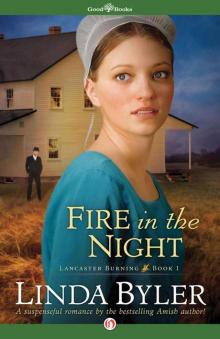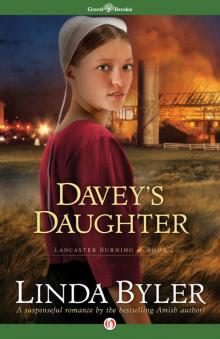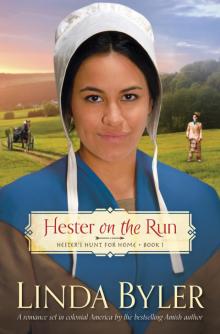- Home
- Linda Byler
Disappearances Page 2
Disappearances Read online
Page 2
“Were you working when they arrived?”
“Yes,”
“What did they look like?”
“Just … well, two very dirty, poor children. Their clothes were in tatters. Too big. They just hung on their thin shoulders.”
No answer, just a nodding of three heads in unison.
“Where are they now?”
“Why don’t you talk to Richard Caldwell, the owner of the ranch?” Sadie asked, a bit hesitantly, yet braving the adversity she felt would come.
“We did.”
Instantly, Sadie felt more at ease. She visibly relaxed, let go of the hem of her white apron, which she had been twisting between her thumb and index finger. If they talked to Richard Caldwell first, and he sent them here….
Yet, there was a lingering doubt.
“They are adopted, the way we heard.”
“Yes, I think legally.”
They nodded.
Then, they all showed their identification. They worked for the government, some kind of detectives who handled special kinds of cases. (Sadie didn’t completely understand it.) Apparently, the children had disappeared with their mother. The father was a fugitive, a person of interest who was running from the law. The mother was also under suspicion, although her complete disappearance was the only reason. They needed information. Everything would be recorded. How much did she know?
Sadie told them everything from the moment the children appeared at the kitchen door, about the bag of costly jewelry, the safe where it was held, their impeccable manners, their names.
When she mentioned their names, two of them shook their heads.
“No, no. Not their real names.”
Sadie’s eyes opened wide.
“Really?”
“No. Their mother, or whoever took them away, did a good job of masquerading the real kids. Their names are Sebastian and Angelica Hartford, of the Dallas Hartfords?”
Sadie shrugged her shoulders.
“Ever watched the TV show, Dallas?”
“No.”
“Well, there’s more money than you can ever imagine involved.”
“These kids are victims of a serious ring of horse thieves. The only thing they ever did wrong was to have eyes and ears. They know too much, and, we’re surmising, so does their mother. There is an old, old bloodline running in the veins of some of these horses, an Arabian strain, that makes them worth thousands and thousands of dollars. There was one stable here in Montana that unknowingly housed a stallion carrying the bloodline. The horse thieves knew this. Stole a lot of horses. I think what happened, it was a mistake gone completely haywire.”
Sadie swallowed hard. The room spun, then righted itself, her breathing came raggedly now, as she acknowledged the fact that she knew a whole lot that could help these men tremendously.
But … should she?
With all her heart, she longed for Mark. He would know what to do. She had seen the identification. But why the ponytail? The mustache? Their clothes did not fit her mind’s description of a detective. Was that only the Amish way instilled in her?
You expected people to dress a certain way, to look the way you think they should. Men wore hats and suspenders buttoned to broadfall trousers. Older women combed their hair flat, wore larger coverings, wore darker, plainer fabric and colors. Young girls arranged their hair in nicer waves, wore smaller coverings, brightly colored dresses. Little boys wore straw hats, denim trousers. Everything was in order and expected to appear a certain way.
People who worked for the government wore uniforms and cut their hair close to their heads, didn’t they? She would have to know. So she asked them. Hesitantly at first, but gaining strength as she talked.
“What do you think ‘undercover agent’ means?” the heavyset man asked, a broad smile on his face, widening to a likeable grin.
The man with the glasses, (what was his name?) pushed them up again, squinted more than ever, but smiled genuinely.
So she told them everything. The black stallion’s return, Cody, Paris, the shootings, the close calls, the Amish people’s frustration with the local police.
At the mention of Paris, Dave Sims’ eyes bore into hers. He shook his head from side to side as she mentioned the narrow escapes.
“Do you have any idea of the danger you are living with?” he finally ground out, his face turning a dark shade of red.
“Are you here alone, every day?” the thinner man asked, keeping himself professionally in check.
“No. I work at the Caldwell … Aspen East. Aspendale,” she stammered.
“Your husband?”
“A farrier. Works for Richard Caldwell.”
“Where is this horse named Paris?”
“In the barn.”
They all looked at one another, compressed their lips.
“Do you have the registration papers?”
“Yes. In fact, I do. They were one of the last things I brought from my parents’ house. I’m … it’s been a bit over two months since we’ve been married.”
“That’s wonderful. Congratulations.”
“Thank you.”
“Can we see the papers?”
“Yes, of course.”
She found them in the pocket of the notebook, where she had filed more important documents until she could arrange them properly in Mark’s bottom file drawer. When she produced the papers they needed, Dave Sims extracted an envelope from an inside pocket of his coat. They all bent their heads, clucked their tongues, read portions out loud, then sat back. Dave Sims told Sadie she was the owner of an extremely valuable horse who was in grave danger and would have to be taken away if she wanted the horse to stay alive, or wanted both herself and Mark to remain safe.
“But you can’t take Paris!” she burst out, unashamed now, her only thought how much Paris would miss her, how unhappy she’d be away from Truman and Sadie and Mark and Wolf. In the end, she gave in. There was no other way.
Chapter 2
WHEN MARK ARRIVED HOME she threw herself into his arms and cried and sniffed and mumbled and blew her nose, her eyes red, her nose swollen, her hair disheveled, until he led her to the new beige-colored sofa with the gray cushions. He told her to stop crying, calm down, and start all over.
He held her hands and stroked her back reassuringly as she repeated her story much slower this time, hugging him and begging him to try and do something about Paris. They simply could not take her away.
“And the thing that worries me just as much—what in the world will happen to Dorothy if she finds this out? She’ll be beside herself without those children.”
Mark said she wouldn’t have to know, and Sadie said that wasn’t one bit fair, that it was better to tell her, which is what she did when she went to work the next day.
She went straight to Richard Caldwell’s office, glad to hear his voice welcoming her in, glad to hear every word he had to say about her and Paris.
Yes, he believed it was as serious as the men had said. Paris would have to go to an undisclosed location, despite Sadie’s vehement protests that Paris would be perfectly all right in the barn.
“Who knows I got married and live with Mark now?” she finished, a note of rebellion hanging on the question.
“You want my personal opinion, Sadie? You better do what you’re told. Until this whole thing is cleared up, anyway.”
Sadie said nothing, still hoping for a chance to keep Paris in the barn where she would be perfectly all right, thank you very much.
However, they agreed to tell Dorothy about the children together. When she was called into the office, she waited a good 10 minutes before making her appearance, then blew through the door, prickly with irritation, sat solidly on a leather wing chair, then almost slid off, her short legs putting a halt to it by digging into the carpet, definitely not helping her dignity.
“Now what do you want, Mr. Caldwell?” she said, putting all the impatience she could into the “Now.”
“This is
very important, Dorothy,” Richard Caldwell said soberly.
“Hardly more important than my roast of beef. That Erma don’t know how to trim it, so she don’t.”
Sadie squelched a giggle. Erma Keim had only one name here at the ranch, and it was “That Erma.”
Continued combat, she thought.
Richard Caldwell assured her it was much more important than roast beef and proceeded to tell her in a level, quiet voice everything that had occurred, which left poor Dorothy rocking from side to side in agitation.
“Oh, come on now, they can’t take my babies. They’re in school! You can’t take kids out of school. They’re mine. I don’t care if those men say they’re the government, you can’t take kids out of school.”
With that, she pulled a bobby pin out of her gray hair and dug so viciously in one ear that Sadie was afraid she’d never find it again. Dorothy remembered what she was doing and put it back in her hair, clearing her throat self-consciously.
A wave of pity rolled over Sadie’s heart. Dorothy was so small and plump, her polyester slacks too short around the ankles, her beige shoes from the Dollar General splattered with bacon grease, her multicolored shirt exposing too much of her wrinkled neck, a cloud of bluster and sense of self riding solidly on her gray head.
Richard Caldwell went on explaining patiently. If they found the mother of their children and she was proved innocent, Dorothy would have to give them up.
Shaking a plump finger in Richard Caldwell’s direction, Dorothy told him the Lord had sent Marcelona and Louise; they were her beloved angels sent straight from heaven, and he’d not allow them to be taken away. And don’t you kid yourself, she was going to go back to her roast beef, and if he wasn’t going to do anything about Erma Keim trimming off too much fat, then she’d have to do it herself, or he’d be eating a roast beef that had the taste and texture of good shoe leather, and she meant it.
She slid off the leather chair after that display of territorial words and bustled straight back to the kitchen, leaving a vapor of martyrdom behind her. Richard Caldwell shook his head, then exploded in a volcanic bellow of laughter that brought one just like it from Sadie.
They wiped their eyes, smiled, then agreed to let it go. They had told her the truth, and now it was up to Dorothy to accept it.
Sadie vacuumed and dusted, scoured bathrooms, and as always, thoroughly enjoyed cleaning this grand house. There was just something about being in a home as beautiful as this that fulfilled a sense of longing for the finer things in life.
In her circles, Sadie knew this lust of the world, this lust of the eyes, was accompanied by a firm denouncing of it. She was admonished to take up the cross, deny herself, and follow the narrow path of Jesus, which she felt was good and right. Sadie wanted no life other than the one she led, the goal of which was to live in a way that would lead to heaven.
That was how she was born. Amish. To parents who wanted this way of life, this security for their children. The heritage passed on from generation to generation.
It was hard to explain when English people asked questions, implying the senselessness of driving a horse and buggy or having no electricity. And if it was so wrong, why ride in a car at all?
It wasn’t wrong for Richard and Barbara Caldwell to have their beautiful home. They were living their lives the way their parents lived theirs, doing what, to them, was right. That was fine.
Sadie loved her employer and his wife, defending their lifestyle if anyone dared say anything negative. They were kind, caring people, who did what was right for their employees, even if they lived lavishly, according to Amish standards. She would never judge them.
She stopped in the upstairs bathroom to lift the slatted wooden blind and gaze out across the snowy ranch land. It spread as far as the eye could see, the scenery so beautiful it could take your breath away, especially in winter.
She would have to ride Paris this evening. One more time before they took her away. Paris loved the snow, taking great plunging strides, spraying clouds of it when she ran, the cold air slamming into Sadie’s face, Reuben at her side, yelling and laughing.
She’d have to leave a message for him on her parents’ phone. Maybe he could ride over tomorrow after work.
As it turned out, Reuben had to work late. Dat started a new log cabin that needed the concrete poured for the footer before the next snow arrived.
A week later, the government men came and took Paris away. Sadie refused to watch, throwing herself on their bed, shutting out any sound with the pillow clamped over her head as tightly as possible. She lifted it cautiously to listen for any sounds before emerging from the bedroom, her ears red, her eyes swollen from crying.
Catching sight of herself in the mirror, she was shocked to see how old and careworn she appeared. So she took a shower, changed to a dress the color of cranberries, brushed her teeth, and decided to grow up and stop being so immature about Paris. She was just a horse.
Then Sadie thought of Paris stepping down from that trailer after a long cold journey, her large brown eyes with the thick, bristly lashes looking at everyone and everything with so much trust in them. Sadie’s lips trembled, her nose burned, and she started sobbing all over again.
Mark told her to go home and spend the day with her mother and sisters. She needed it.
And that’s exactly what she did, being greeted with cheers and hugs and coffee and French toast, maple syrup and chipped beef gravy, fried cornmeal mush, and Mam’s perfect dippy eggs.
Leah was working at her cleaning job, but Rebekah and Anna were at home. They caught up on the latest news, the life of dating, being with the youth, their work, Reuben turning 16 before too long, and Mam’s concern about Reuben’s time of rumspringa, literally translated as “running around,” which is exactly what the youth did after they turned 16.
Mam was in high spirits, making them all laugh with stories about the last quilting she had attended. She had to get started piecing Leah’s Mariner’s Star quilt, with the feeling goading her that Kevin had marriage on his mind.
“But, can you imagine, a Mariner’s Star in black and beige? It’s enough to give me the blues. All that black!”
“Get Fred Ketty to piece it,” Rebekah suggested.
“Fred Ketty?”
“They said she did one with black and … I forget what else, but she got over 900 dollars for it.”
“Where?”
Mam was so incredulous her mouth formed a perfect O, then closed tightly after she pronounced the “where.”
“She sold it at the fire hall, remember? That auction in August.”
“See, that shouldn’t be allowed. That’s too much display … of … Well, it’s just too worldly, parading a quilt like that at a fire hall. Likely it was raffled off or whatever, and that’s too much like gambling, and that’s strictly verboten, you know that.”
Mam became so agitated she started scraping leftover crusts of French toast into the garbage, her face with heightened color, her nostrils flaring.
Rebekah winked broadly at Sadie, with the sort of look that said, “Mam’s just jealous,” but in a loving way. You could never hate your mother. You could get irritated, even angry for a short time, but if she had a whole list of failures, you sort of loved even the shortcomings. Mam so obviously prided herself in her own ability to piece outstanding quilts that this sort of news was a bit much.
After the conversation lagged, Anna got up, saying she had a dress to sew, so Rebekah and Sadie could do the dishes.
“What color are you making?” Sadie asked.
Anna brought out a three-yard piece of fabric, the color a hue of brilliant magenta with a decided stripe in it.
“Mam!” Sadie gasped. She was clearly shocked.
Why would Mam allow a color that bold, a stripe that pronounced? She obviously hadn’t. Calmly, Mam laid down her plate, then came over to peer at the offending color and texture.
“Where did you get this, Anna?”
“Wal
mart.”
Anna’s eyes were very large in her too-thin face, the angle of her beautiful cheekbone so pronounced, her chin so tiny, the cleft in it showing so plainly. Her dress, as usual, hung on her thin frame, gathered about her tiny waist by the broad belt of her apron.
Anna was the youngest and battled eating disorders. With little sense of self-worth, always appearing overweight and ugly in her own eyes, she had taken to purging. Sadly loathing herself and her pitiful ability to be a friend, she felt she had nothing to contribute to a conversation or any circumstance in which she found herself. Anna was one of the reasons it had been difficult for Sadie, often acting as a mentor to her troubled sister, to leave home.
Mam pursed her lips now and said evenly, “I hope you know I can’t let you make a dress with that fabric, Anna.”
It was all Anna needed to release the spring of tension, the bottled up volcano of rebellion against Mam, or Sadie, or anyone who tried to take this dress away from her. It was completely essential that she wear this dress, the object that would surely grab and keep Neil Hershberger’s faithful devotion.
“Oh, no! You’re not taking this dress away from me!” she shouted, her beautiful eyes already forming tears. “I paid for it with my own money! No. You’re not. I’m going to wear it!”
She turned, sobbing, running up the steps, the priceless magenta-colored fabric clutched tightly to her thin chest.
Mam started to follow, a hand out, calling her name, but Sadie stopped her. “I’ll go after awhile.”
“I don’t know what to do. She is so different from all you other girls. I plum don’t know how to handle it.”
With that, Mam sat down wearily, suddenly overcome with her daughter’s rebellion coupled with Fred Ketty’s 900 dollar quilt.
“Mam, you know her whole problem is that she has to be on top of the pile,” Rebekah said harshly.
“Ach, Rebekah,” Mam said sadly.
“I’m serious. She can’t give up. If that would have been me, you would not have been overwhelmed very long. Bingo! In the trash! Subject closed!”
Mam laughed, her plump stomach shaking with mirth. “Now stop it,” she said, still laughing.

 A Second Chance
A Second Chance Lizzie's Carefree Years
Lizzie's Carefree Years The More the Merrier
The More the Merrier Love in Unlikely Places
Love in Unlikely Places Running Around (and Such)
Running Around (and Such) Wild Horses
Wild Horses Lizzie Searches for Love Trilogy
Lizzie Searches for Love Trilogy Lizzie and Emma
Lizzie and Emma Little Amish Matchmaker
Little Amish Matchmaker The Witnesses
The Witnesses The Healing
The Healing Home Is Where the Heart Is
Home Is Where the Heart Is Fire in the Night
Fire in the Night When Strawberries Bloom
When Strawberries Bloom Little Amish Lizzie
Little Amish Lizzie Which Way Home?
Which Way Home? The Homestead
The Homestead Sadie’s Montana Trilogy
Sadie’s Montana Trilogy Davey's Daughter
Davey's Daughter Hester on the Run
Hester on the Run Disappearances
Disappearances Big Decisions
Big Decisions Becky Meets Her Match
Becky Meets Her Match Hope on the Plains
Hope on the Plains Christmas Visitor
Christmas Visitor